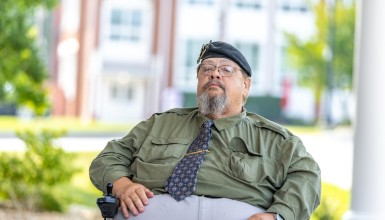To embrace the future, you must first understand the past.
“Those who don’t understand history are doomed to repeat it,” it’s said. Well, “those who don’t understand history” must not have been history majors at Cumberlands. At this university, we don’t limit our bachelor’s degree in history to merely studying politics and recounts of countries; much more lies beneath the surface, and we dig in! The small class sizes here give you a more involved and personable classroom experience, and our knowledgeable and caring faculty will help you choose the combination of courses that best support your goals and dreams.
You have the power to take the past, remold it in the present, and improve the future; no other degree can do what history program can. The world “way back when” may have the key to transforming the world we know today into one we can be proud to teach in the future. Not to mention, innumerable careers benefit from the skills you learn in a history degree program, giving you an advantage in your job search after college. Or, if you’d like to further your education, stepping into a graduate program is an easy transition.
By the Numbers
$63,940
4%
1 in 5
5
Programs & Requirements
* The credit hours listed on this page only reference the specific program requirements and is not reflective of the total hours necessary to receive your degree. Cumberlands requires all students obtain a minimum of 60 hours for an associate’s degree and a total of 120 hours for a bachelor’s degree. Transfer and prior learning credits may be counted toward those totals.
To learn more about our General Education Requirements, please visit the page referenced below or explore our Academic Catalog.
Bachelor of Science in History
Discover the fascinating past of America and the rest of the world! With a Bachelor of Arts in history, you will embark on an adventure to reveal the secrets of people from the past and learn to apply it to make a better future. From the U.S. to the U.K. to the rest of the world, an informed understanding of the culture and power dynamic of different continents is vital to create a future that’s worthwhile. With the knowledge of what happened in years prior, you can forge a new path in life. In your history classes at Cumberlands, you will research wars, influential people, cultural eras and how they impacted the population, and much more!
Course Requirements
- HIST 137 - World Civilization to 1648
- HIST 138 - World Civilization since 1648
- HIST 131 - United States History to 1877
- HIST 132 - United States History since 1877
- HIST 224 - Research Mechanics
- HIST 225 - Research Composition
- POLS 131 - Introduction to Political Science
- POLS 233 - American National Government
- POLS 235 - Introduction to International Relations AND
- POLS 490 - Senior Research Composition OR
- HIST 490 - Senior Research Capstone
All Electives must be 300/400 level in HIST or POLS prefixes.
Students must take at least 6 credit hours of HIST courses, at least 3 credit hours of which must be at the 400 level.
A Bachelor of Arts requires all the same courses as a Bachelor of Science with the addition of four classes (12 hours) in a foreign language.
Choose one foreign language sequence:
- FREN 131 Elementary French I
- FREN 132 Elementary French II
- FREN 231 Intermediate French I
- FREN 232 Intermediate French II
- SPAN 131 Elementary Spanish I
- SPAN 132 Elementary Spanish II
- SPAN 231 Intermediate Spanish I
- SPAN 232 Intermediate Spanish II
Minor in History
Have you always liked learning about history but wrestled with whether you should turn it into your career or not? Good news: University of the Cumberlands offers the perfect balance so you can learn more about what you love while still pursuing a different degree. When you minor in history, you open the doors for valuable and marketable information to add to your repertoire, all while you chase after your other dreams.
Course Requirements
Choose two courses from the following:
- HIST 334 - Intermediate Studies in Early American History
- HIST 335 - Intermediate Studies in Modern American History
- HIST 336 - Intermediate Studies in European History
- HIST 337 - Intermediate Studies in Military History
- HIST 338 - Intermediate Studies in Intellectual History
- HIST 339 - Intermediate Studies in Constitutional History
Choose two courses from the following:
- HIST 431 - Advanced Studies in Early American History
- HIST 432 - Advanced Studies in Modern American History
- HIST 433 - Advanced Studies in European History
- HIST 434 - Advanced Studies in Military History
- HIST 438 - Advanced Studies in Intellectual History
- HIST 439 - Advanced Studies in Constitutional History
Bachelor of Science with a Major in History & Political Science
Interested in politics but still want to study history? UC's Bachelor of Science in History & Political Science offers you the best of both worlds. No need to double major when we've got everything you need in one degree! Explore the depths of U.S. and world history and learn no navigate the future through a political lens! With classes that dive into the expanse of government and powers, you will equip yourself with a well of invaluable knowledge that you can use in your personal as well as your professional life! Learn about the past, and acquire the skills needed to change the future!
Course Requirements
- HIST 137 - World Civilization to 1648
- HIST 138 - World Civilization since 1648
- HIST 131 - United States History to 1877
- HIST 132 - United States History since 1877
- HIST 224 - Research Mechanics
- HIST 225 - Research Composition
- POLS 131 - Introduction to Political Science
- POLS 233 - American National Government
- POLS 235 - Introduction to International Relations
- POLS 490 - Senior Research Composition OR
- HIST 490 - Senior Research Capstone
- All Electives must be 300/400 level.
- 6 Credit Hours must be HIST electives, the remaining 12 hours from HIST or POLS electives
Core course sequence is the same as the bachelor of science program. Bachelor of Art students must take 12 credits of the Lower Division General Education requirement in the same World Language. Complete 12 credit hours of one foreign language sequence.
- FREN 131 Elementary French I
- FREN 132 Elementary French II
- FREN 231 Intermediate French I
- FREN 232 Intermediate French II
- SPAN 131 Elementary Spanish I
- SPAN 132 Elementary Spanish II
- SPAN 231 Intermediate Spanish I
- SPAN 232 Intermediate Spanish II
Take the Next Step
Mission & Goals
The goal of the Department of History at UC is to guide you as you pursue the intellectual, spiritual, and social objectives of the university, while simultaneously gaining an understanding of historically relevant topics as they apply to the world today.
History Careers & Outcomes
*All statistics from the U.S. Bureau of Labor and Statistics
Curator: $50,120
Curator: $50,120
Archivists appraise, process, catalog, and preserve permanent records and historically valuable documents. Curators oversee collections of artwork and historical items and may conduct public service activities for an institution. Museum technicians and conservators prepare and restore objects and documents in museum collections and exhibits.
High School Teacher: $61,820
High School Teacher: $61,820
High school teachers generally teach students from the 9th through 12th grades, specializing in an area such as math, science, or history. Some choose to teach a skill or even several different classes within a general subject area.
Historian: $63,940
Historian: $63,940
Historians research, analyze, interpret, and write about the past by studying historical documents and sources.
Management Analysts: $93,000
Management Analysts: $93,000
Management analysts, often called management consultants, recommend ways to improve an organization’s efficiency. They advise managers on how to make organizations more profitable through reduced costs and increased revenues.
Archeologist: $61,910
Archeologist: $61,910
By drawing and building on knowledge from the humanities and the social, physical, and biological sciences, anthropologists and archeologists examine the ways of life, languages, archeological remains, and physical characteristics of people in various parts of the world. They also examine the customs, values, and social patterns of different cultures.
Paralegal: $56,230
Paralegal: $56,230
Paralegals help lawyers prepare for hearings, trials, and corporate meetings. They use technology for managing and organizing the increasing number of documents and data collected during a case. They also help discover and organize materials such as emails, data, documents, accounting databases, and websites for cases and other legal pursuits.
Common Questions
A history degree involves studying past events, societies, and cultures to understand how they shape the present and future. The program emphasizes critical thinking, research, writing, and analysis of historical sources and narratives.
A bachelor's degree in history typically takes four years to complete when studying full-time. An associate degree usually takes about two years, while graduate degrees such as a master's or doctoral degree will require additional time.
Yes, many institutions offer history degrees online. These programs often include online coursework and may require participation in virtual discussions or research projects. Some programs might also offer hybrid options combining online and on-campus components.
A history degree can be worth it if you are passionate about understanding and interpreting past events. It develops valuable skills such as research, writing, and critical thinking, which are applicable in various career fields. It can also be a strong foundation for further education or specialized career paths.
With a history degree, you can pursue careers such as historian, curator, archivist, high school teacher, archeologist, management analyst, or paralegal. The degree provides skills that are valuable in many fields, including education, research, museum curation, and consulting.
To obtain a history degree, you need to enroll in an accredited program offering either an associate’s or bachelor’s degree. The program will require you to complete coursework in various historical periods and themes, research projects, and possibly internships or practical experiences.
A history degree teaches you to analyze and interpret historical events, understand cultural and societal developments, conduct research, and communicate findings effectively. It provides insights into how historical contexts influence contemporary issues and practices.
Yes, many institutions, including Cumberlands, allow students to double-major. Combining history with another field can enhance your expertise and open up diverse career opportunities.
History classes typically involve lectures, discussions, research assignments, and exams. Courses may cover specific historical periods, themes, or geographic areas, and often include analyzing primary and secondary sources.
A history degree remains relevant as it provides critical thinking and analytical skills applicable in various professions. It is valued in fields such as education, research, public policy, and cultural preservation.
The cost of a history degree can vary widely depending on the institution and location. For example, Cumberlands lists a cost of $9,875, though this can differ based on specific fees and additional expenses. Financial aid and scholarships may be available to help offset costs.
Faculty Experts in History and Political Science
Learn more about the professors you will interact with in the Department of History

Catherine Ball, JD

Dr. Michael Spurlock

Dr. Chuck Smith
Request Information
Learn more about all that Cumberlands has to offer.

